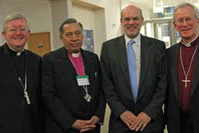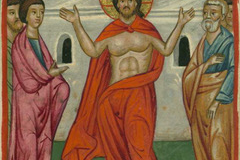Archbishop Longley speaks on importance of Religious Education

Archbishop Longley at lecture - image Peter Jennings
Archbishop Bernard Longley questioned the Coalition Government decision to leave Religious Education out of the English Baccalaureate, during the fourth of the five 2011 Edward Cadbury Lectures, under the auspices of the School of Philosophy, Theology and Religion, at the University of Birmingham.
The 5pm lecture on the topical theme "The Parable of the Sower and the Purpose of Education" took place at the Department of Theology and Religion in the European Research Institute Building, on Thursday 24 March.
At the start of the lecture Archbishop Longley invited Mrs Stella Jennings, a member of the audience, to read the Parable of the Sower and the Seed (Matthew 12:1-9, 18-23) from the authorised, King James version of the Bible.
The Archbishop of Birmingham began: "Tonight’s lecture is my final formal contribution to this week’s series of Edward Cadbury Lectures on the theme of Parables for the City. So far it has been a fascinating journey through the landscape of a handful of parables as presented in the King James translation. That landscape has revealed, perhaps sometimes surprisingly, many features that are familiar to us today in the City of Birmingham and in our own experience.
"At first sight you may question the appropriateness of the parable of the sower to the subject of education. Am I guilty of reducing the notion education to the scattering of information from a munificent source or teacher to be accepted and enabled to develop by those who have the capacity to do so? Well, no: I don’t regard education simply in such terms, but I do think the parable is able to yield some helpful insights into the experience of offering and receiving an education."
Archbishop Longley continued: "It seems to be widely accepted that within our country education should be held as something of the highest value especially for children and young people. We see this in the vast and welcome array of provision that is increasingly made for the education of people at every stage of life.
"At this moment, we find ourselves on the edge of great educational change both in higher education and in schooling. Whether or not we agree with these changes there is a significant desire to be constantly working towards advancing what education has to offer and the contribution it can make to society at large.
"For centuries the Church has made an enormous contribution to education in this land and beyond. It offers us a way in which its faith and life can contribute something to the vision, aims and process of educating each succeeding generation in every time and place.
"The teaching of Christ is always at the heart of and key to the mission and work of the Church. It is the Risen Christ who commands the apostles to go forth and proclaim the good news, to teach to the ends of the earth (Mk. 16:14-16). Therefore the educative work of the Church is found in universities and schools, in shanty towns and vast prosperous cities, in lands of famine and disease and in lands of plenty. Wherever the Church is, her mission and task to educate will be found."
The Archbishop continued: "The ground provides a symbol through which we can look at the world and the society in which we live. Our contemporary world is filled with a huge array of variations, somewhat like the ground in the parable. Some of this variety is certainly due to the advances that have been made through science and technology and to the great changes we have witnessed in society. Some have been significantly influenced by the way in which society understands the contribution that religion or faith makes to its life."
Archbishop Longley stressed: "Championing the rights of the individual and relegating the authority of God has significant consequences for the way in which religious faith and the learning that derives from religion is viewed at large. Perhaps we can see this motif at work in the recent development of the English Baccalaureate by the new coalition government.
"To a certain extent the government has sidelined the value of religious education in society by failing to include it with the essential components of the new educational qualification.
"Failing to recognise RE amongst the humanities subjects being taught towards this new qualification, surely implies a judgment about what religious education can contribute towards the formation and education of the human person? Such a move declares that the influence of religion on contemporary British society and its structures of education are to be significantly underplayed. Our own Faith Leaders Group has made representations to the Government."
The Archbishop of Birmingham concluded: "Today we continue to see important signs of men and women responding to Christian education and formation. There are some real signs of a shift in our society which is demonstrating a greater openness to embracing and learning from religious faith and what it has to offer.
"Here in the City of Birmingham we have seen the development of the new Agreed Syllabus for Religious Education which recognises the contribution of faith to the greater good of the communities that make up the people of this city. It also recognises the fact that humanists do not speak for the entirety of the people of this land, that religious belief is important to many people and shapes the way they live and it emphasises the positive contribution they make to society."
Archbishop Longley answered a number of wide-ranging and searching questions asked by members of the audience about the role of faith and its part in education in today's society.
On the subject of voluntary aided faith schools remaining within the state education system, the Archbishop of Birmingham emphasised: "There is far more to be gained by faith schools remaining within the present structure. It is important to maintain the position of the voluntary aided faith schools in the state education system. It would be a very radical thing to abandon the links."



















